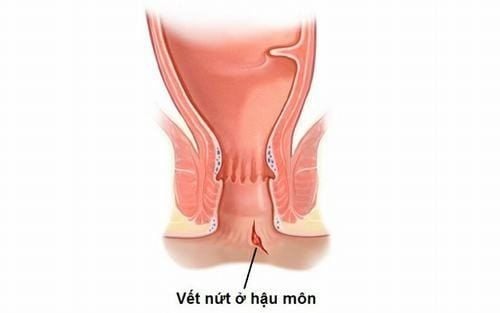This is an automatically translated article.
Posted by Master, Doctor Mai Vien Phuong - Department of Examination & Internal Medicine - Vinmec Central Park International General Hospital
Correct. You may be constipated but still have a bowel movement. Constipation is usually defined as having fewer than three bowel movements per week. However, constipation has several other potential symptoms. The article below gives more information about why constipation (and incomplete indigestion) occurs, as well as how to treat and prevent it.
1. Passing dry hard stools but still feeling constipated
You will have bowel movements that are formed with soft stools and defecate easily (without straining or struggling for a long time).
While there is no perfect number of bowel movements you should have each week, most people aim to have a bowel movement every one to two days.
When you're constipated, things are a little different. You can sit on the toilet for a long time, trying to have a bowel movement. You may also feel like you need to have a bowel movement but only have a few hard, dry stools and you still feel like you can have more bowel movements.
This is called incomplete bowel movements and is a characteristic symptom of constipation.
2. What causes incomplete bowel movements?
The list of causes for an incomplete bowel movement is very long. From diet to medication to lifestyle, there are many factors.
Common causes
Diet. Not drinking enough water or eating enough fiber are common causes of constipation. Replacing these foods with dairy products and sugary foods can aggravate the problem. Switching to a diet higher in fiber and fluids can help relieve symptoms of constipation in many people. Ignore the urge to go. If you resist the urge to poop too often, it messes with your nerves that sense when it's time to poop. Over time, this can lead to constipation. Irritable bowel syndrome (IBS). This condition can cause chronic constipation as well as stomach pain and bloating. Medicine. Many medications can slow bowel movements or affect how the nerves and muscles in the digestive tract work. While you shouldn't stop taking any medication without your doctor's approval, medications for conditions like depression, diabetes, high blood pressure, and Parkinson's disease can cause constipation. Sedentary lifestyle. Movement and exercise can help stimulate the bowels to move stool forward. People who are in bed or physically active are less likely to have incomplete bowel movements. Difficulty defecation. This condition occurs when the nerves and muscles responsible for promoting bowel movements do not work together as they should. For example, if the anal muscles are not relaxed enough for stool to leave the body, or if the rectal muscles constrict instead of relaxing.

Less common cause
Anal fissure. An anal fistula occurs when there is a tear near the end of the anus. This often causes extreme pain when trying to have a bowel movement. Cancer . Bowel and anal cancers can cause constipation. Other symptoms may include rectal bleeding, chronic stomach upset, and unexplained fatigue. Hypothyroidism. An underactive thyroid affects hormones that promote digestion, which can lead to constipation. Neurological disorders plant. Disorders such as Parkinson's disease or a history of brain injury can lead to nervous system dysfunction that causes constipation. Narrow foreskin. Foreskin stenosis occurs when part of the intestine becomes narrower. It's harder for stool to pass through this tight space. Anxiety and depression. A strong connection exists between body and mind. People who are anxious or depressed are more likely to experience incomplete bowel movements. Unfortunately, taking medications for anxiety and depression can also contribute to constipation. Your health care provider can help you determine if your current condition or medications are causing your constipation.
3. How long does it take for constipation to go away?
Constipation can be a problem for a number of reasons. One, it's not comfortable. Second, it increases the risk of problems like stool and bowel obstruction, which prevents stool from leaving the body.
Constant constipation can lead to hemorrhoids, anal fissures, diverticular disease, rectal bleeding, and rectal prolapse.
Despite the fact that everyone experiences cyclical constipation, there are times when you should call your doctor. These include:
Abdominal pain or bloating (bloating) and you don't go to the bathroom for a few days Going longer than five days to a week without a bowel movement Having to use laxatives more than two to three times per week Bleeding rectal Consider your symptoms as a whole when trying to decide if it's time to call your doctor. If constipation and discomfort are becoming the rule, not the exception, it's best to talk to your healthcare provider.

4. How can I have normal bowel movements again?
Health care providers can immediately treat constipation with medicines that make stools softer and easier to pass. Examples include over-the-counter medications, such as laxatives or stool softeners.
In rare cases, the doctor will need to remove the stool which may necessitate a stool movement (hard stools, build-up in the rectum that cannot be passed).
If there are problems such as strictures, anal fissures, or other physical problems with the intestines, your doctor may recommend surgery to correct the problem.
5. How do I prevent this from happening again?
There are a number of lifestyle changes that can help prevent constipation from occurring. These preventive tips can also help treat constipation.
To prevent or treat constipation, try:
Drink plenty of water each day to make your urine light yellow Engage in regular physical activity, such as walking or swimming, to promote movement of the bowel Go to the bathroom when you feel the need; some people will even try to go to the bathroom at the same time every day to "train" their bowels Incorporate more fiber in your diet, such as fruits, vegetables, and whole grains seed ; a goal of about 25 to 30 grams of fiber per day is a good goal You can also talk to your healthcare provider about prevention tips. They can take into account your overall health and dietary needs and come up with a good plan for you.
Conclusion You can still have a bowel movement and become constipated if the stool you pass doesn't give you the satisfaction of a good bowel movement.
Don't be embarrassed or anxious to approach the topic of constipation with your healthcare provider. Pretty much everyone has been constipated at least once in their life, so there's nothing to be ashamed of.
Because there are so many lifestyle methods and medications you can use to relieve constipation, it's best to talk to your healthcare provider about potential treatments, especially if Your constipation is chronic.

Please dial HOTLINE for more information or register for an appointment HERE. Download MyVinmec app to make appointments faster and to manage your bookings easily.
ReferencesConcerned about constipation? (two thousand and thirteen). nia.nih.gov/health/concerned-about-constipation Constipation. (2018). niddk.nih.gov/health-information/digestive-diseases/constipation/symptoms-causes Dyssergenic defecation: About a common cause of constipation. (2016). iffgd.org/lower-gi-disorders/dyssynergic-defecation.html?showall=1 Encopresis. (n.d.). stanfordchildrens.org/en/topic/default?id=encopresis-90-P01992














